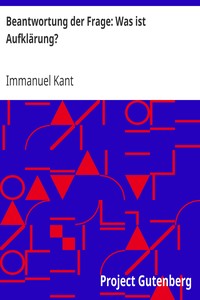Beantwortung der Frage: Was ist Aufklärung? by Immanuel Kant
"Beantwortung der Frage: Was ist Aufklärung?" by Immanuel Kant is a philosophical treatise written in the late 18th century. This work addresses the concept of enlightenment and the journey of individuals toward intellectual maturity. Kant explores the ideas of autonomy, reason, and the critical importance of freedom in the pursuit of knowledge, positioning enlightenment as a collective emergence from self-imposed immaturity. In this essay, Kant argues that enlightenment is fundamentally about the
ability of individuals to think for themselves without the guidance of others. He critiques societal structures that foster intellectual dependency and calls for the courage to use one’s understanding. He emphasizes that true enlightenment requires freedom, particularly the liberty to engage in public discourse and critique doctrines. Furthermore, Kant distinguishes between public and private use of reason, indicating that while societal roles may impose restrictions on private reason, public reason must remain free for enlightenment to flourish. Ultimately, he suggests that society is on the cusp of enlightenment, though it has yet to fully realize it, and advocates for a gradual process of intellectual emancipation. (This is an automatically generated summary.)
Read or download for free
| How to read | Url | Size | |||
|---|---|---|---|---|---|
| Read now! | https://www.gutenberg.org/ebooks/30821.html.images | 48 kB | |||
| EPUB3 (E-readers incl. Send-to-Kindle) | https://www.gutenberg.org/ebooks/30821.epub3.images | 102 kB | |||
| EPUB (older E-readers) | https://www.gutenberg.org/ebooks/30821.epub.images | 100 kB | |||
| EPUB (no images, older E-readers) | https://www.gutenberg.org/ebooks/30821.epub.noimages | 84 kB | |||
| Kindle | https://www.gutenberg.org/ebooks/30821.kf8.images | 247 kB | |||
| older Kindles | https://www.gutenberg.org/ebooks/30821.kindle.images | 239 kB | |||
| Plain Text UTF-8 | https://www.gutenberg.org/ebooks/30821.txt.utf-8 | 40 kB | |||
| Download HTML (zip) | https://www.gutenberg.org/cache/epub/30821/pg30821-h.zip | 100 kB | |||
| There may be more files related to this item. | |||||
Similar Books
About this eBook
| Author | Kant, Immanuel, 1724-1804 |
|---|---|
| Title | Beantwortung der Frage: Was ist Aufklärung? |
| Note | Wikipedia page about this book: https://en.wikipedia.org/wiki/What_Is_Enlightenment%3F Wikipedia page about this book: https://de.wikipedia.org/wiki/Beantwortung_der_Frage:_Was_ist_Aufkl%C3%A4rung%3F |
| Credits | Produced by Jana Srna and Philipp Zeinlinger |
| Reading Level | Reading ease score: 62.1 (8th & 9th grade). Neither easy nor difficult to read. |
| Language | German |
| LoC Class | B: Philosophy, Psychology, Religion |
| Subject | Philosophy, Modern -- 18th century |
| Subject | Enlightenment |
| Category | Text |
| EBook-No. | 30821 |
| Release Date | Dec 31, 2009 |
| Most Recently Updated | Jan 5, 2021 |
| Copyright Status | Public domain in the USA. |
| Downloads | 560 downloads in the last 30 days. |
| Project Gutenberg eBooks are always free! | |

